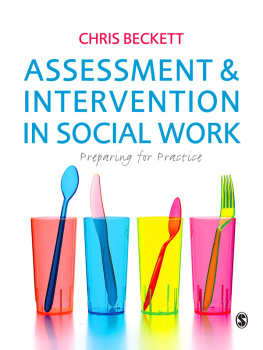Chris Beckett 2010
First published 2010
Apart from any fair dealing for the purposes of research or private study, or criticism or review, as permitted under the Copyright, Designs and Patents Act, 1988, this publication may be reproduced, stored or transmitted in any form, or by any means, only with the prior permission in writing of the publishers, or in the case of reprographic reproduction, in accordance with the terms of licences issued by the Copyright Licensing Agency. Enquiries concerning reproduction outside those terms should be sent to the publishers.
SAGE Publications Ltd
1 Olivers Yard
55 City Road
London EC1Y 1SP
SAGE Publications Inc.
2455 Teller Road
Thousand Oaks, California 91320
SAGE Publications India Pvt Ltd
B 1/I 1 Mohan Cooperative Industrial Area
Mathura Road
New Delhi 110 044
SAGE Publications Asia-Pacific Pte Ltd
33 Pekin Street #02-01
Far East Square
Singapore 048763
Library of Congress Control Number: 2010926585
British Library Cataloguing in Publication data
A catalogue record for this book is available from the British Library
ISBN 978-1-84860-130-7
ISBN 978-1-84860-131-4 (pbk)
Typeset by C&M Digitals (P) Ltd, Chennai, India
Printed and bound in Great Britain by TJ International Ltd, Padstow, Cornwall
Printed on paper from sustainable resources
INTRODUCTION
- The nature of social work
- Recognising our limits
- Using this book
This book is about how we come to make judgements about what needs addressing in a given situation (assessment), and about providing a service (intervention). It is about how you decide what needs doing, in other words, and what you actually do. Since these two activities arguably encompass most of the job of a social worker, the book could almost just have been called Doing Social Work.
The book is aimed in particular at social work students who are on placement, or are writing about their placements. This book does not offer a comprehensive how to do it guide, and does not pretend to offer comprehensive cover of all the literature, but I hope it will help you to think about what you are seeing and doing, and support you in using your own eyes, ears and critical faculties. Part of being a good social worker is being awake to what is around you, thinking for yourself, and not just repeating formulas provided for you by others, whether those others be your employers, your teachers, your colleagues or even your service users.
As I will mention more than once in the course of this book, social work intrudes into the personal sphere and involves interactions with human beings that can sometimes completely transform their lives, for better or for worse. This places a heavy obligation on social workers to think as clearly as possible about what they are doing and why. (The fact that social work deals with people who are relatively marginalised in society physically frail old people, children, people with disabilities, young offenders, people with mental health problems increases this obligation.) What makes social work particularly challenging, though, is that it combines this potential for transforming lives (think of a child being removed from a parent and placed for adoption, to give one extreme example) with an absence of a precise science to guide it, or even anything approximating to a precise science. This means that in trying to decide how best to approach a problem we cannot fall back on certainty and cannot rely on formulas. We can often only do the best we can, trying to be as clear-headed as possible about the implications of what we are doing.
It is my belief that a book is more interesting to read if the writer invests something of himself in it, and is prepared to express his own views. I therefore offer here a particular perspective. Mine is of course only one persons perspective, with all of the blind spots and limitations that implies, but I think the most useful thing I can do is to try to present that perspective honestly to try to be honest about how I see things rather than to try to offer some sort of bland consensual view. The reader is of course most welcome to disagree with me.
THE NATURE OF SOCIAL WORK
My grandmother disapproved of social work. She felt that the sort of work that social workers do ought to be left to family, neighbours, churches, volunteers, not done as a job for pay, not professionalised, but carried out as a basic moral duty, an expression of being human, as she believed had happened in the past.
Actually I dont believe there was ever a time, prior to the advent of organised professional social work, in which everyone was wonderfully looked after by these informal networks. If you read novels from the eighteenth and nineteenth centuries (look at Defoes Moll Flanders, Charlotte Bronts Jane Eyre, Dickens Nicholas Nickleby) you encounter a world in which mentally ill people could be locked away out of sight in institutions or in back rooms in their own homes, children could endure abuse alone with no one to turn to for help and people who could not support themselves could end up in the workhouse. We should be really under no illusions that a golden idyll of mutual care existed in the past into which social work intruded, like a bossy and unwelcome guest at a happy party. Nor does such an idyll prevail, as far as I know, in those present-day societies where professional social work (at least as it is understood in Europe and North America) still does not exist, though it is true that people from developing countries are often shocked by the way in which (for instance) white British people allow strangers to care for their elderly relatives.
The fact remains, though, that social work does intrude into the personal area of life, into family relationships, into peoples homes. And social work can be an unwelcome and sometimes bossy guest, not only offering but also sometimes even imposing alternatives to the informal networks of family and neighbourhood. My grandmothers unease about the whole enterprise is still widely shared, as is demonstrated by the prevalence of various negative stereotypes of social workers as interfering busy-bodies, as do-gooders, as bureaucratic tyrants imposing politically correct dogma, or as bleeding hearts making excuses for bad behaviour. And, while no social worker likes these labels, I think many social workers actually to some extent share the underlying unease. Any good social worker will at some point wonder if they are making things worse for people rather than better.

















